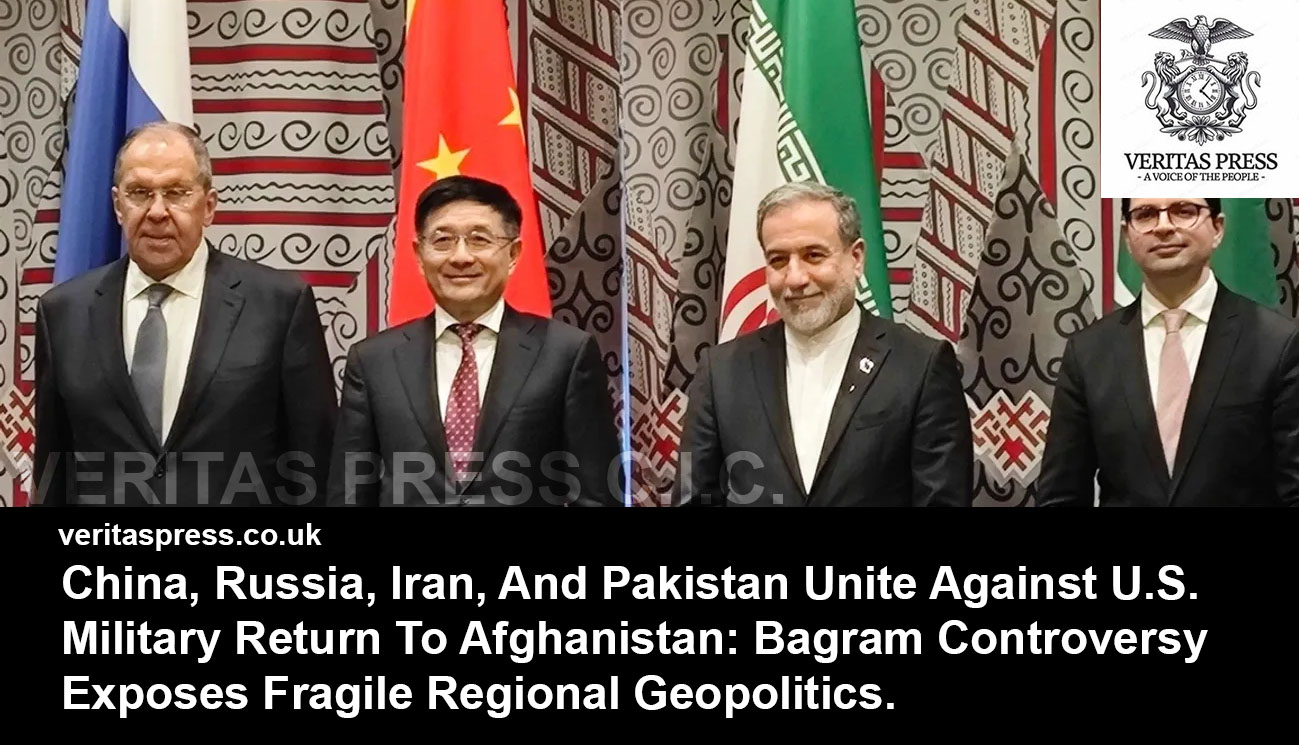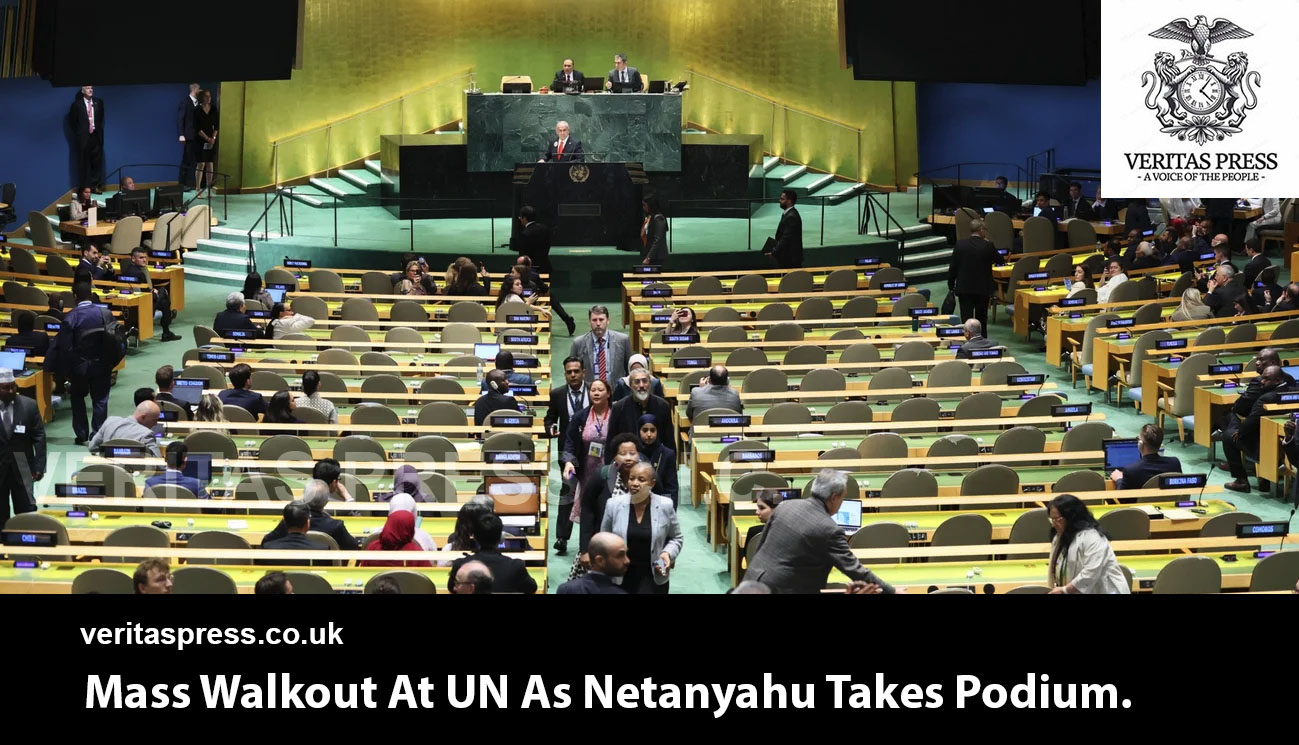NEW YORK / KABUL, September 2025 – In a decisive diplomatic move at the 80th United Nations General Assembly, China, Russia, Iran, and Pakistan jointly opposed any attempt by the United States to reestablish military bases in Afghanistan, signalling a rare regional consensus against renewed American intervention. The opposition comes in direct response to former U.S. President Donald Trump’s demand that the Taliban hand over Bagram Air Base, a site long symbolic of U.S. military dominance in Afghanistan.
The dispute exposes deeper geopolitical fissures, highlighting U.S. overreach, the limits of coercive diplomacy, and the evolving balance of power in Central and South Asia amid decades of war, sanctions, and humanitarian collapse.
Quadrilateral Meeting At The UN: A United Front.
On September 25, 2025, senior diplomats and foreign ministers from the four nations convened on the sidelines of the UNGA to discuss Afghanistan. According to Chinese Foreign Ministry spokesperson Guo Jiakun, the meeting issued a joint statement emphasising respect for Afghanistan’s sovereignty, independence, and territorial integrity, while reaffirming firm opposition to foreign military bases inside or near Afghanistan.
“This fully reflects the neighbouring countries’ respect for Afghanistan’s sovereign independence and national dignity,” Guo said, framing the consensus as both a geopolitical necessity and a moral stance.
Attendees included Russian Foreign Minister Sergey Lavrov, Iranian Foreign Minister Seyed Abbas Araghchi, China’s Special Envoy on Afghanistan Yue Xiaoyong, and Pakistan’s senior diplomat Umer Siddique. Analysts view the coordinated statement as a strategic push to assert regional influence and counter U.S. unilateralism.
Bagram Air Base: Flashpoint Of U.S.-Taliban Tensions.
Bagram Air Base, located 64 kilometres north of Kabul, served as a central hub for U.S. operations until the withdrawal of American forces in 2021. After the Taliban regained control, Trump demanded its return, citing counterterrorism concerns and the base’s proximity to Chinese nuclear facilities, warning that “bad things” could happen if the Taliban refused.
The Taliban rejected the request outright. Spokesman Zabihullah Mujahid stated,
“Not even one inch of our land will be given.”
and referenced the 2020 Doha Agreement, which prohibits U.S. interference in Afghanistan’s internal affairs.
Experts argue that any attempt to forcibly reclaim the base could trigger a regional crisis, complicate security cooperation, and deepen the country’s humanitarian crisis.
Counterterrorism And Regional Security:
The quadrilateral statement highlighted the presence of terrorist groups in Afghanistan, including ISIS, Al-Qaeda, the East Turkestan Islamic Movement, Tehrik-e-Taliban Pakistan, Jaish al-Adl, and the Balochistan Liberation Army. China, Russia, Iran, and Pakistan called on the Taliban to take “effective, tangible, and verifiable” measures to dismantle these groups, prevent recruitment and financing, and shut down training camps.
“The U.S. cannot claim unilateral authority to dictate security policy in Afghanistan,” said Dr. Salman Rafiq, senior South Asia analyst at the Institute of Strategic Studies, Islamabad.
“Regional powers are asserting that Afghan security is a collective responsibility, not a U.S. mandate.”
The statement also stressed inclusive governance, women’s rights, minority protections, and refugee returns, highlighting the interconnectedness of human security and regional stability.
Economic Sanctions and Reconstruction:
The quadrilateral ministers emphasised the need to lift sanctions, expand trade, and support reconstruction. Analysts note that U.S. insistence on Bagram control could be a tactic to maintain leverage over Afghanistan’s economic and diplomatic channels, potentially worsening humanitarian conditions and fueling radicalisation.
“Military coercion without economic relief exacerbates instability,” said Dr. Maria Cheng, senior fellow at the Centre for Global Policy Studies.
Conclusion: Bagram As A Litmus Test For Sovereignty And Regional Balance.
As the U.S. insists on regaining Bagram Air Base and the Taliban resist, Afghanistan finds itself at the centre of a multilayered geopolitical contest. The coordinated stance of China, Russia, Iran, and Pakistan reflects a broader regional strategy to contain U.S. influence, stabilise Afghanistan under regional supervision, and mitigate threats from terrorist organisations.
The Bagram dispute is emblematic of a larger struggle over sovereignty, regional influence, and the rules of engagement in a post-American war order. The situation exposes the limits of coercive diplomacy: military threats and strategic pressure from Washington, framed as counterterrorism measures, clash with the legitimate aspirations of a sovereign nation and the coordinated regional insistence on non-interference.
Observers warn that the coming months will determine not only the fate of Bagram Air Base but also the trajectory of Afghanistan’s post-conflict recovery, regional security dynamics, and the credibility of multilateral diplomacy in curbing unilateral military interventions. The dispute highlights the delicate balance between Afghanistan’s sovereignty and the interests of regional powers. While the Taliban’s rejection of U.S. military presence is clear, regional dynamics continue to evolve, with discussions ongoing about how best to address security concerns, counter terrorism, and promote reconstruction in a manner that respects Afghanistan’s autonomy.
Ultimately, Bagram is not just a military base; it is a symbol of contested power, competing visions for Afghanistan’s future, and the broader struggle to define the rules of engagement in a post-American order. How the U.S., the Taliban, and regional powers navigate this standoff will reverberate across Central and South Asia, shaping alliances, security architecture, and the prospects for peace in a country that has endured four decades of war and foreign intervention.
Advertisements
Tags:






























Leave a Reply